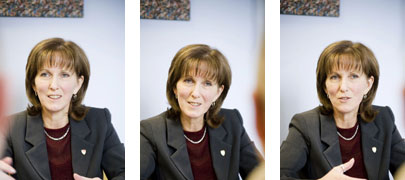
Asked what it's like to be a woman in a traditionally male field, Louise Savard says, "It's never been an issue. Although I'm often the only woman, all the men here have been supportive ."
Claudio Calligaris
Entre nous with Louise Savard, Interim Director, University Safety
Safety is her job No. 1
On Jan. 1, 2007, Louise Savard assumed the position of Interim Director, University Safety. A longtime McGill employee, Savard came to McGill in 1974 to work in Management Systems (now the IST group). Over the course of the next 33 years, the affable Savard saw the inner workings of McGill more than most, with stops in the Department of Geology, the faculties of Arts and Science, the Students Affairs Office, the Treasury Department and, most recently, as Manager of Security Services. She recently sat down with the McGill Reporter to fill us in on the newly created position.
As Interim Director, Security Safety, what is your mandate?
This is a one-year appointment during which I will direct and coordinate the operations Security Services, Environmental Health and Safety, Fire Prevention and Waste Management. My main goals are to get these four units working closer together and to establish linkages to students, faculty, staff and the community in general.
You served as Manager of Security Services from May 2002. How did you get involved in the security field?
Prior to working for Security Services, I had had no previous experience. I was at a point in my life where I was looking to do something different. I had been the Mortgage Officer of McGill, so I had been working a lot with professors and staff members, but I wanted to get closer to the students. The job posting stated that I had to be available 50 percent of the time to walk around campus and I thought to myself "wouldn't that be< wonderful?"
So you don't know ju-jitsu or any other deadly martial art?
[Laughing] No, no black belts. The trick is to surround myself with people who can handle the rough stuff.
Has there been any "rough stuff?"
Not at all. We're lucky because McGill is such a safe environment. There's rarely anything like that. Three years ago we had an anthrax scare at the Stewart Biology building, but it was a false alarm. But it was a great exercise for us and proved that we have fantastic networking possibilities here. We had lots of help from various faculties and we hooked up with the communications people to keep everyone abreast of the situation.
Is it safe to say that, under your direction, Security Services dramatically increased its visibility?
Absolutely. When I started at Security Services, we worked really hard on educating the community on who we were and what services we provided. A lot of people had no idea that we're open 24 hours a day, seven days a week. Suddenly they realized "although I'm working late at night, I'm not alone." As a result we got more calls—not because there were more problems, but just because people knew we were there. By working together, we're making the campus safer and safer.
It sounds like you're being asked to do more of the same in your new job in terms of raising the visibility of the units under your direction.
The most important thing right now is to make sure that staff and students know what they need to know to stay safe. New professors should know exactly who they need to contact at Environmental Health and Safety for information when they are setting up their new lab. Students should know that if they lose their keys, they can call the Security Services 24-hour number at 398-3000 to have a security agent come and assist them. And it's not just safety issues. We have an excellent Waste Management program that, among other things, will pick up and recycle old computer equipment.
How will you go about raising the public's awareness?
First of all, we're getting people from each of the units to get out into the community. At Security Services, we would set up tables and kiosks around campus and at different events to hand out pamphlets and talk to people about crime prevention. We'll use the same model here, except on a larger scale.
Did the Dawson tragedy change the way we operate here at McGill?
It made us aware of the importance of not only having solid emergency procedures in place, but having that information disseminated to the public. Again, it is a question of education.
Having emergency procedures on paper is one thing, but shouldn't people be practicing those procedures?
For sure, which is why the Fire Prevention unit does evacuation exercises every year. People need dry runs to know how to react should a situation arise.
Search
Search (skip):
Louise Savard's first job:
"My first job was being a big sister. I come from a family of five, so at a very young age I was responsible for my brothers and sisters. Maybe there is a link there—from taking care of my siblings to taking care of the people on campus."

